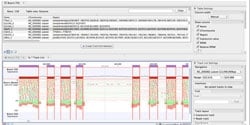
- #Clc genomics workbench number of reads too low full version
- #Clc genomics workbench number of reads too low manual
- #Clc genomics workbench number of reads too low software
The last thing I was trying to do is just to import an annotated hg19. Not much useful though, as indices at the end are a way off, illustrations and examples provided do not correspond what you see on the screen, selections to be made are missing - you got to be kidding me?
#Clc genomics workbench number of reads too low manual
Yep, the manual is intimidating - hundreds of pages. Well, all right, at least you pay for well documented and well maintained software. No, you cannot question the logic behind that - a standard, however stupid, cannot be changed because of end user, but we do strive to meet expectations.
#Clc genomics workbench number of reads too low software
There is absolutely no justification why a user-friendly software cannot handle that and upon importing in its wonderful convenient specific format labels the entire 20+ million fasta dataset as protein leaving the end user with no other choice but to search the dataset manually to remove those 1-2 bizarre reads just to make it usable. Illumina software very rarely, but does throw into reads bizarre letters, like F, or Q, which may be found in a few reads out of, say 20 million. That was always my experience when I tried to ask - why this way and why not this way? Can I do this? Why not, as this makes a little sense?įor example, why I have to waste the storage space to import gigabytes of my existing databases to create yet another database in a program-specific format that cannot be read by other software? Convenience of associated metadata? OK, but why this convenient format does not allow a reference assembly against selected genome regions, while open-source software allows that using less convenient data formats? No, you have to use the entire genome - it will be slow though. Once the juggernaut is assembled and sold to you - you, stupid end user do not even try to question programmers' logic behind its beautiful design as you just not capable to get its beauty from your end user pimple point of view. The main problem that keeps me avoiding commercial supposedly more user-oriented and conveniently integrated software (that is what you are paying for, right?) was in fact it is totally opposite. So far it was mostly frustrating experience, but I wonder if someone is more satisfied. Now it is coming to end and I need a make decision whether it worth to pay for.
#Clc genomics workbench number of reads too low full version
Message me if you'd like to see some codes I've used or have any other questions.I took advantage of CLC's offer last spring to get a free 6 mo trial evaluation of full version of their Genomic Workbench. I would encourage you to seek further support in your research community and start fiddling around with RStudio and these various packages. I feel publishing with these types of R packages are more credible in the literature as well. I don't know where you are at in your career, but learning these tools has made me feel ahead of the game and more trusting of my results. Many others have stood where you're standing, resulting in a lot of blog posts etc. Although, command line analysis is quite difficult at times to learn and incredibly frustrating, it's not impossible. Therefore, I would advise to use CLC as more of a preliminary analysis tool. I ended up getting clearer results that I trusted and understood better after abandoning CLC and using DESeq and EdgeR (with DESeq being my preferred method). Hi Cristina, I previously used CLC for RNA-Seq analysis and fiddled with lots of parameters, my final output delivered a low number of differentially expressed genes (DEG) that were uninformative. Message me if you'd like to see some codes I've used or have any other questions.



 0 kommentar(er)
0 kommentar(er)
